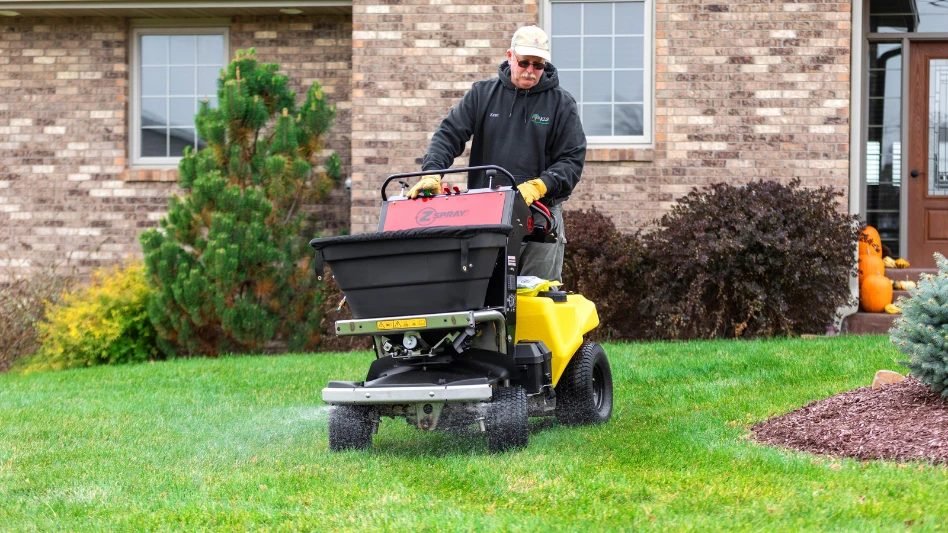
Erik Lowes sat down to crunch some numbers so he could figure out exactly how much his business was spending on fuel. Three years ago, that number rounded out to about $30,000. “Fuel is our second largest expense, behind labor,” says Lowes, president of Cuba, Missouri-based Lowes’ Landscaping. “I thought, we can definitely work on labor expenses, but we need to work on fuel, so I started researching.” He saw propane advertised and looked into it. “I stayed up nights, late, doing cost analyses based on our usage,” he says.
Crunch the numbers.

Lowes figured out his mowers used about 2.5 gallons of gasoline per hour, and at $3 per gallon, that equated to $7 per hour to run a mower. He could get propane for $1.39 a gallon then, which meant spending about $2.50 per hour given the usage rate. (Propane mowers burn about 1.5 gallons per hour at Lowes’ Landscaping – a gallon less than gas-powered mower engines, based on his estimates.)
With four mowers running about 400 hours per year, the potential savings quickly added up and justified investing in propane mowers.
His machines were already aging, so the timing was right for a switch. “I could get a 25 percent fleet discount, so I bought four machines and basically got one free,” he says.
Then, Lowes found out about PERC incentives. He was able to score $8,000 in federal incentives, and another 15 percent off the total mower purchase price from the state of Illinois. That equated to about $2,000 off per machine, and Lowes runs 60-inch mowers.
“I was getting really excited at this point,” Lowes says.
Labor costs.
Then, Lowes went back to labor expenses. Every day, crews stopped at a gas station to fuel up.
“That was reduced because by working through a propane distributor, we now have a bulk fuel tank so one guy can fuel up all of the tanks two times a week,” he says. “That means I have one guy fueling up tanks as opposed to five guys going to a gas station.
Now, the crews fuel their service trucks before the workday and one dedicated crewmember manages the task.
All of this streamlining of fuel and reduction of mid-day stops improved labor costs, too. “Our cost per man-hour has decreased by $6 because of efficiency – not only because of fuel, but better processes,” Lowes says. “That’s money in our back pocket whereas before, we were at break-even with mowing. Now, mowing is profitable again.”
Immediate savings.
Before Adam Linnemann of Columbia, Illinois-based Linnemann Lawn Care & Landscaping switched to propane, he figured the cost of filling a fuel tank versus a propane tank. “Our propane tanks are 33-pound cylinders that hold 7 pounds of propane,” he says. He currently gets propane for $1.34 per gallon.
“You’re getting the same production out of the tank as you would gasoline,” Linnemann says. “Right off the bat, there’s a savings in fuel cost.”
Linnemann opted to purchase already-converted propane mowers as opposed to using a conversion kit like some landscape professionals do because he believes the rebates are better.
Plus, he prefers to turn mowers over after their three-year warranty so he can rest assured that maintenance issues will not crop up.

“The mowers have more power when running propane vs. gasoline, and less pollutants,” Linnemann says. “The mowers don’t bog down in heavy grass as much, and engines run cleaner so there is less time and cost associated with maintenance like oil changes.”
In fact, Linnemann switched engines to propane and oil to synthetic. That combination has seriously extended the period in between oil changes, he says. “You can practically change the oil twice a year vs. doing it monthly,” he says.
Linnemann received incentives of $1,000 per mower from PERC and $1,500 from the Illinois Propane Gas Association.
Today, all eight mowers in Linnemann’s fleet are powered by propane fuel. “It helps to have a good relationship with your dealer and with your fuel supplier,” he says. “When you work together, the conversion can be seamless.”

Explore the February 2017 Issue
Check out more from this issue and find your next story to read.
Latest from Lawn & Landscape
- Retargeting Ads – A Secret Weapon for Growing Your Lawn Care Business
- Leading a growing company
- Project EverGreen launches Clean Air Calculator
- Rain Bird acquires smart lawn care company OtO from Toronto
- PBI-Gordon names Marvin as VP of research and development
- Mean Green rolls out Vanquish Autonomous mower
- Focal Pointe launches new podcast series
- Navigating due diligence checklist for selling lawn business





